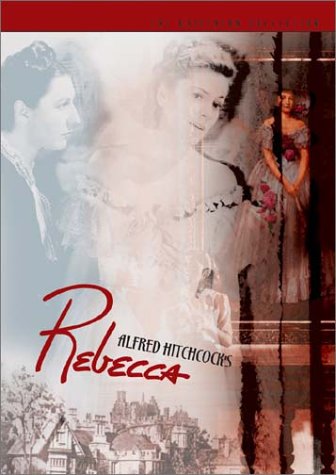Rebecca review by Jackass Tom
Hitchcock’s First Hollywood Deal
If you have read my reviews or at least perused them, you will notice that I am a fan of Alfred Hitchcock's work. I will say that it was probably the master of suspense himself that pulled me out of the “Star Wars Syndrome.” The “Star Wars Syndrome” is what I call the state in which a movie-goer will not watch a movie favorably if it was done before the ‘Holy Trilogy.’ I was once in that mindset and I believe it was Rear Window that pulled me out. At that point I became entranced by Hitchcock’s dark classics. Rebecca was Hitchcock’s entry way into Hollywood. He had done well for himself in his homeland of England (The Lodger, Lady Vanishes) and powerhouse producer David O. Selznick, fresh off of his glorious success with Gone with the Wind thought he would try his hand a Hitchcock. In Rebecca he was hoping to harness the director’s talents in the genre of harlequin romance, a genre where Selznick had reaped bountiful success. Rebecca was considered a success (Selznick picked up the Oscar for Best Film), but in terms of Hitchcock films seems a bit slow and lethargic.
Rebecca, the character, is the most talked about, admired and hated character in this film but you never see her. You guessed it, she is dead. Her presence/ghost still haunts the walls and rooms of her former home, Mandelay. Her widowed husband Maxim De Winter (Lawrence Olivier) has since remarried a younger, more naïve woman (Joan Fontaine) who goes without a name (“hey you”, ”Mrs. De Winter”). Maxim seems to be broken up over the death of Rebecca: he never seems happy, jumps into violent outrages, and almost jumps off a cliff. His young wife is constantly compared to her and constantly falls short. Rebecca was a woman of noble class, intelligent, strong, commanding, and most important breathlessly beautiful. The simple “second Mrs. De Winter” can’t even hold up her own against the brooding Mrs. Danvers, Mandelay’s chief maid. Mrs. Danver’s is a mean, spirited, and somewhat insulted that Maxim would marry under Rebecca’s standards. Her loyalty to Rebecca’s legacy creates a friction between her and the new wife. In one of the more moving scenes, she stands at an open window with the crying Joan Fontaine urging her to end her life, and jump to her death.
This film is know for its battle for control over the final cut between producer David Selznick and director Alfred Hitchcock. Hitchcock grew up in movies as a storyboard writer back in the silent days and this carried over to his directorial career. In Rebecca, like all his other films, he storyboarded each and every shot making the camera work and shooting completely efficient. This didn’t sit well with Selznick, however, who liked to have a number of shots to cut and chose from. Selznick eventually went back and filmed more scenes after Hitchcock had left the set and inserted them into the movie. The story itself was a battle as well. The struggle for piece of mind, and solving the mystery of both Maxim’s personality and Rebecca’s death are obviously points the work of Hitchcock. He also accentuated the character of Mrs. Danvers who ended up being the most evil and obviously most interesting character in the film. Selznick wasn’t interested in the ‘macabre,’ he expected Rebecca to be more of a romance between Olivier and the up-and-coming cardboard actress Joan Fontaine. In the end, you end up seeing elements of both minds and the film becomes a bit disjointed. Afterwards, however, Hitchcock went on to become a critical and popular success and Selznick went insane trying to achieve the greatness he had with Gone with the Wind.
There is a neat twist at the end but you really have to wait through a lot of crap for it. There is a severe lack of chemistry between Fontaine and Olivier due to Olivier’s mysterious character, and also his lack of respect for Fontaine’s acting. You can see what he is talking about too: she lacks delivery and presence. I just don’t buy it. Then again I don’t buy Olivier either. Mrs. Danvers is evil enough to scare the devil. I don’t know who could live in a house with her making your bed. Her character is the most fun to watch. Overall the movie lacks fire. It starts as a romance, gets a little darker about an hour later, and then things start to shape up by an hour and thirty, but you will probably fall asleep before then. There are some standard Hitchcock moments, but they aren’t as good as the ones in his other films, and you can probably find them on some AMC special on his birthday anyway. Look elsewhere for your Hitchcock fix, unless you are trying to fill up your Criterion Collection library.




4 out of 10 Jackasses blog comments powered by Disqus
Search
Rebecca

IMDB Link: Rebecca
DVD Aspect Ratio: 1.33:1
DVD Extras: Its Criterion Collection, Film Scholar commentary, Hitchcock discusses it with Truffaut, screen tests, essay on Rebecca by the author, and more.